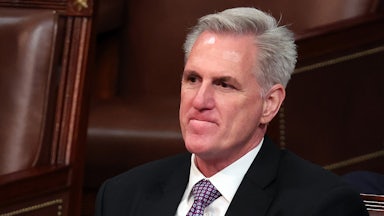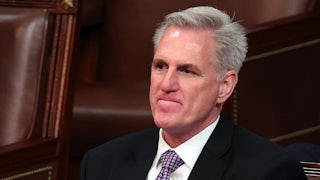In the state that offers the best Senate pickup opportunity for Democrats this cycle, Pennsylvania Democrats are having to grapple with an increasingly unwieldy and heated Democratic primary contest, a fact that threatens to play a major role in the direction of the race—and the balance of the Senate in 2022.
Last weekend, the Pennsylvania Democratic Party opted against endorsing any candidate in the state’s primary to succeed retiring Senator Pat Toomey. The outcome was expected, but it only increased the likelihood of an extended primary with multiple candidates and no presumptive nominee.
In interviews I did over the last two days, Democrats are conceding that this primary won’t be locked up with a de facto candidate who can leverage the blue tilt of the state. Again and again, Pennsylvania Democrats conceded that although it’s early and the field is divided, the primary would likely stay that way. “Yeah, I think it will,” Jonathan Seidel, a Pennsylvania Democratic National Committeeman said when I suggested the internal feuding among the four candidates could go on and intensify until the May 17 primary.
The primary is divided among four Democrats: Congressman Conor Lamb, who won an intensely fought race for a swingy district in the western part of the state in 2018; Lieutenant Governor John Fetterman, a six-foot-nine Democrat aligned with the progressive wing of the party; state Representative Malcolm Kenyatta, another progressive who is the only Black candidate in the primary; and Dr. Val Arkoosh, the chair of the Montgomery county commission—a crucial Philadelphia suburb.
Fetterman, who backed Bernie Sanders for president in 2016, is the front-runner by most metrics. He’s raised $2.7 million in the fourth quarter, and a new internal poll released by the Data for Progress think tank on Tuesday found Fetterman leading the rest of the field by about 30 points. But Lamb is the favorite of the party insiders. At last weekend’s endorsement meeting, he came close to getting the official nod and ran far ahead of Fetterman and the others.
The Democratic primary is increasingly looking like a major battleground for two rival factions within the Democratic Party. Lamb has long associated himself with the more moderate or establishment wing of the party, as someone who represents a swing district. Fetterman is a longtime ally of the Bernie Sanders–progressive wing. There’s almost no way these two don’t become champions for their opposing factions as the nomination nears.
It’s important to note that Republicans have their own increasingly heated primary. David McCormack, a former hedge fund executive who served in the George W. Bush administration’s Treasury Department, has been leveraging his finances and financial connections to rise to contention in the Republican primary. He’s running against former television host Dr. Mehmet Oz, former Republican nominee for lieutenant governor Jeff Bartos, and former Trump administration Ambassador Carla Sands (who saw a major staff exodus among lackluster fundraising numbers). As with Democrats, there’s no sign that the primary will dwindle down to just one candidate, officially or otherwise. The candidates in the Republican primary are also jostling to associate themselves most closely with former President Donald Trump. It’s unclear who has the inside track at the moment, but McCormack and Oz both have attributes that could easily propel them to victory: name identification and money. Support for Trump is a valuable commodity in the primary, as well, but that could end up being a liability in the general election.
For Republicans, this Senate race is somewhat important. Pennsylvania tilts blue, and it even elected a Democratic governor during Trump’s rise to the presidency and time in office. For Republicans, winning the Senate race would allow them to retain a seat that could very easily fall into Democratic hands. But Pennsylvania isn’t the biggest priority for the GOP this cycle. There are too many races where they hope to have the advantage and flip a Senate seat: Georgia, New Hampshire, and Arizona all look flappable. So they don’t really need Pennsylvania.
For Democrats, the situation is far more serious. Pennsylvania is the best pickup opportunity for them this cycle. In the most realistic scenarios where Democrats retain control of the Senate, they will do so by the thinnest of margins. In other words, a flip of this seat would help Democrats keep and maybe expand their Senate majority, thereby making Joe Manchin’s machinations less pivotal.
For all of Fetterman’s advantages, though, he’s far from a sure bet. His endorsements are somewhat sparse for a candidate who’s polled ahead of the field and outraised his rivals. Lamb may not have won the party’s nod, but he just barely missed it. He got 61 percent of the vote on the second ballot. A candidate needed two-thirds of the vote to secure the endorsement. Fetterman got a distant 23 percent, Kenyatta won 15 percent on the second ballot, and Arkoosh did not pass the 15 percent threshold to make it to the second ballot (she got just 17 votes in the first round).
Viability is an ongoing theme in this primary. In an interview on Tuesday, Lamb told me that the question of who can win in the general election is the main focus of this primary, not some ideological or policy view.
“I think in the primary it’s basically a single issue, which is who is most likely to win in November. That’s what the voters are telling me. That’s what the state committee want to know about. That’s what everyone asks me when I’m in front of them,” Lamb said. “I’m the only one who has cast votes on all of these important issues that we’re talking about. The Voting Rights Act and women’s health protections. I’ve already had to cast those votes so I can provide a level of certainty to the people that I want to represent that I’m going to deliver for them.”
Joe Calvello, Fetterman’s communications director, said, “2022 is going to be a tough year for Dems. You need someone who people are excited about, and John’s that guy. There’s real enthusiasm and there’s deep support.”
The conventional wisdom is that divided primaries give an advantage to the other side. An extended, bloody primary will often result in a depressed base electorate and a nominee whose faults have already been exposed ahead of the general election. In this case that would mean if the Democratic fight goes on for a while, Republicans could wait in the wings and use some of the same attacks that Democrats leveled against each other in trying to pick a candidate. Of course the same could be true of the Republicans.
There’s research that suggests that divided primaries don’t always kill a nominee’s chances of winning a general election contest. But in federal races, heated primaries do often hurt a party’s chances of winning a general election. Research from the University of Chicago found that the vote share could decrease from anywhere between six and nine percentage points. And the margin of victory in this race is very likely to be smaller than that in 2022.
Democrats hope that a divided primary could actually have some beneficial effects. This is a year when Republican enthusiasm is high across the country and comparably depressed on the Democratic side. Maybe a divided primary with many candidates representing the liberal wing of the party could wake voters up to the urgency of this election and its outsized implications.
“I think the candidates being out there and talking about what’s at stake isn’t necessarily a bad thing,” said J.J. Abbott, a longtime Democratic operative in the state. “I think engaging the electorate, particularly the base of the Democratic Party, is going to be essential over the next few months to improve chances for the general.”
But at some point Democratic voters in Pennsylvania will have to pick a candidate and unite.
“I think the interplay is good,” Jonathan Siedel said. “There is a point where the interplay has to stop, and we have to get behind a candidate. But I think right now the interplay between the four major candidates is a good thing.” Right now. It may feel different in May.










